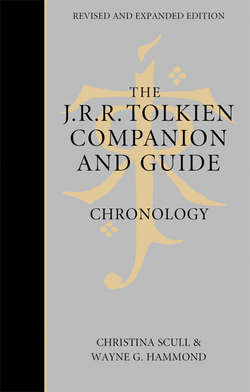Читать книгу The J. R. R. Tolkien Companion and Guide: Volume 1: Chronology - Christina Scull - Страница 25
Оглавление1903
14 April 1903 Frances Bratt dies. In her will she has named her brother, Ernest William Bratt, and her solicitor, Stephen Gateley, as executors, and has set up a trust on behalf of her mother, Jane Bratt, ‘for and during the term of her natural life she thereout maintaining educating and bringing up my Child Edith Bratt by Alfred Frederick Warrillow until she marries’, and with monies held in trust for Edith until she is twenty-one, or marries at a younger age, ‘for her sole and separate use and free from marital control’. She further allowed that if, at the time of Jane Bratt’s death, Edith should be living, under the age of twenty-one, and unmarried, then the monies held in trust should be paid to her guardian ‘to and for the maintenance and education of my said Child until she shall attain the age of twenty one years or marry under that age and any unapplied income shall be accumulated at interest and added to the said capital monies’. The net value of Frances’ estate is £3,797 2s 11d.
With the death of Jane Bratt in 1904 (as it seems), Stephen Gateley will become Edith’s guardian, and will send her to Dresden House School, a boarding school run by two sisters named Watts who place a particular emphasis on music. There Edith will develop her talent for playing the piano.
Spring term 1903 Ronald re-enters King Edward’s School in January 1903. He is placed in the Lower Remove Class under Assistant Master R.H. Hume, and in Section D5.
July 1903 In the School class list of this date, Ronald is placed eleventh out of twenty-four in the Lower Remove.
Autumn term 1903 Ronald advances from the Lower Remove. After leaving one of the Removes or Transitus, pupils have a choice. The School Curriculum of 1906 states that
above Transitus, the average age of which is about 14, though an able boy will usually pass through it quite a year earlier than that, the School is divided into a Classical or Literary, and Modern, or rather Scientific Side. The Modern Side do not learn Greek, nor (except in a Voluntary Class) do the Classical Side learn Science. The amount of time given to Mathematics on both sides is the same, and Modern Languages are also studied on both Sides. Boys who have any prospect of proceeding to Oxford or Cambridge should take the Classical Side, and it is especially desirable that boys who show mathematical promise should do so. All who contemplate a Degree in Arts at any University will naturally take this Side.
Ronald is on the Classical Side, and since there is no Seventh Class on that Side, he moves into the Sixth Class, under Assistant Master *George Brewerton. There he will begin to study Greek, he will be introduced also to *Shakespeare and *Chaucer (and encouraged to read the latter in the original), and with the aid of a primer lent him by Brewerton, he will begin to learn Old English (*Languages). During this term he is in Section B6 for Mathematics and Arithmetic. He will be ranked eighteenth among twenty-three boys in the School class list dated December 1903.
Christmas 1903 Mabel Tolkien sends drawings made by Ronald and Hilary to the boys’ Tolkien grandmother, and comments on how hard Ronald has worked on them since school broke up on 16 December:
Ronald can match silk lining or any art shade like a true ‘Parisian Modiste’. – Is it his Artist or Draper Ancestry coming out? – He is going along at a great rate at school – he knows far more Greek than I do Latin – he says he is going to do German with me these holidays – though at present [with a lingering illness] I feel more like Bed. One of the clergy, a young, merry one, is teaching Ronald to play chess – he says he has read too much, everything fit for a boy under fifteen, and he doesn’t know any single classical thing to recommend him. Ronald is making his First Communion this Christmas – so it is a very great feast indeed to us this year. [quoted in Biography, p. 28]
At his confirmation Ronald takes the additional name ‘Philip’ but will rarely use it. – At about this time, Ronald buys a copy of Chambers’s Etymological Dictionary, ‘the beginning of my interest in German Philology (& Philol[ogy]. in general)’ (note by Tolkien, dated 1973, in his copy of the book, quoted in Life & Legend, p. 16).
